Orchids are as vulnerable as they are crucial in floriculture. Here are the most common pests that affect them!
Orchids possess heavenly beauty, but this charm comes with the downside of being prone to a few pest infestations! Worry not—we help you identify the most common orchid pests and signs of infestations and show you how to get rid of them for good!
Most Common Orchid Pests
1. Mealybugs
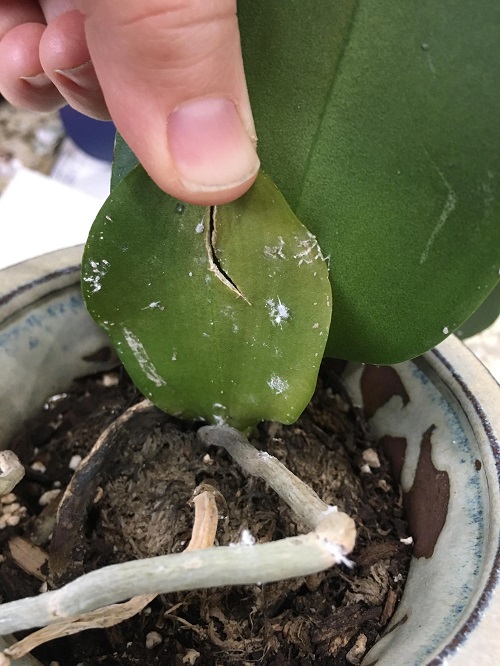
If you see a white blob of cotton sticking onto the stem or leaf of your orchid, you’ve got yourself a mealybug problem! They are small, soft-bodied insects with a waxy texture that feed on the sap of orchids, weakening the plant and causing yellowing leaf.
These pests are like slow poisons; they do not have an immediate effect, but they eventually kill your plant. But you can easily spot them and bid them farewell! Here’s what you do.
Wipe down the leaves, stems, and infected parts with a cotton swab dipped in rubbing alcohol or neem oil spray. If this hasn’t occurred yet, deter mealybug infestations by ensuring proper air circulation and avoiding overwatering.
2. Aphids
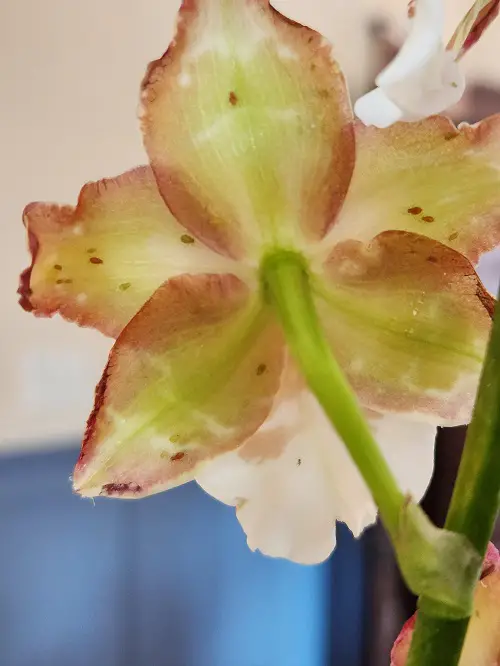
Being less than an eighth of an inch, aphids can fly right under the radar and can secretly wreak havoc on your orchid plant! To the keen eye, they are tiny, pear-shaped pests that usually come in green or black.
They attack new plant growth by sucking its sap and also secretes sticky honeydew that, in turn, attracts mold and ants. If you spot a single aphid, manually pick it out instantly before it multiplies into clusters and colonies!
Look for new growth and use a strong water spray to dislodge them or apply neem oil. And check out our detailed guide to getting rid of mealybugs.
3. Mites
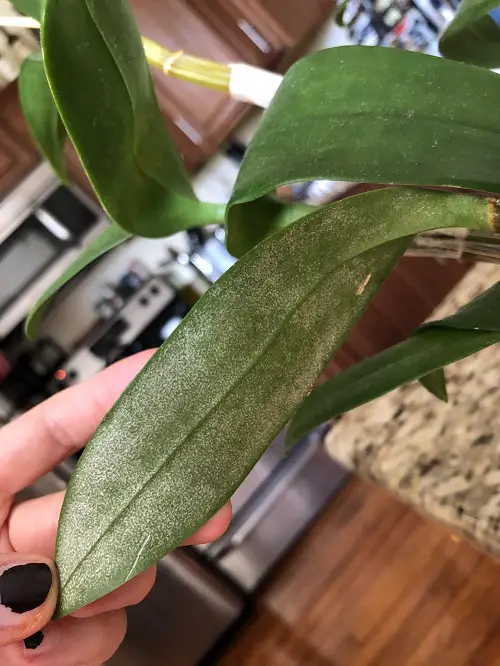
Mites are arachnids and not insects, but they are just as pesky as the other common orchid pests on this list and are super unhealthy for your precious blooms. They are too tiny to discover with the naked eye, but if you find reddish-brown streaks on the leaf’s undersides, that’s the warning bell.
Another way of detecting mites is to find fine webbing around the plant. Mites damage the plant by sucking out the cell contents, leading to speckled or bronzed leaves.
Mites thrive in dry and arid conditions—so ensure the setting is inhospitable to keep them at bay! Start with high humidity levels to prevent mite attacks. However, to treat a pre-existing infestation, clean the plant thoroughly with mild horticultural oil or insecticidal soap.
4. Thrips

Thrips are small, slender, yellowish-brown insects that destroy orchids by sucking out cellular plant matter. They love feeding on the flower buds but can also spread to the foliage. The telltale signs of thrips are silvery scars on leaves or buds that won’t open at all.
Thrips are one of the most elusive pests to deal with. They are small and mobile and spend most of their lives in the soil. Some common solutions are regular preventive inspection, sticky traps, and insecticidal soap.
5. Cockroaches
Cockroaches need no introduction! But it may surprise you that they love orchids as much as you do! They are drawn to orchids for shelter and food but damage the roots and leaves in this process. Luckily, dealing with a roach problem is not all that hard.
Start by keeping your growing spot clean and free of debris. If roaches still hang around, place bait traps around the plants or use diatomaceous earth (DE) to remove them.
6. Caterpillars
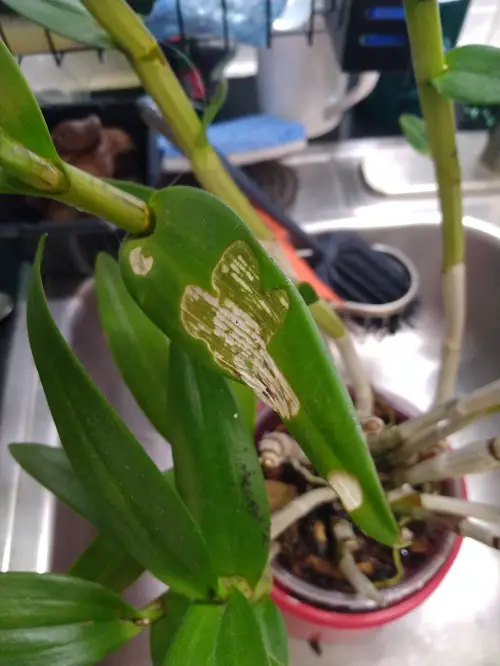
While butterflies and moths are signs of a healthy, biodiverse ecosystem, orchids aren’t the biggest fans of caterpillars! These pretty winged insects lay their eggs on the leafy undersides of orchids. These become fleshy caterpillars that chew through leaves and flowers and leave nothing of the plant to survive.
Prevent caterpillars by checking your orchids regularly, especially the underside of leaves. If you spot them, handpick the caterpillars off the plant or use a biological insecticide like bacillus thuringiensis (Bt).
7. Snails and Slugs
Snails and slugs are slimy mollusks that leave behind silvery, sticky trails as they crawl. They might be slow, but they will tear through your orchid leaves and roots at an exponential pace, causing immense harm to the plant’s structure and growth.
Chemical baits, ash, and DE can be scattered around your orchids to trap and kill these pests. A cool way to keep snails and slugs away is to put small containers filled with beer in your gardening space; these pests drown in it.
After treating your orchids for pests, follow these steps to ensure they stay healthy and bloom well.
8. Scale Insects
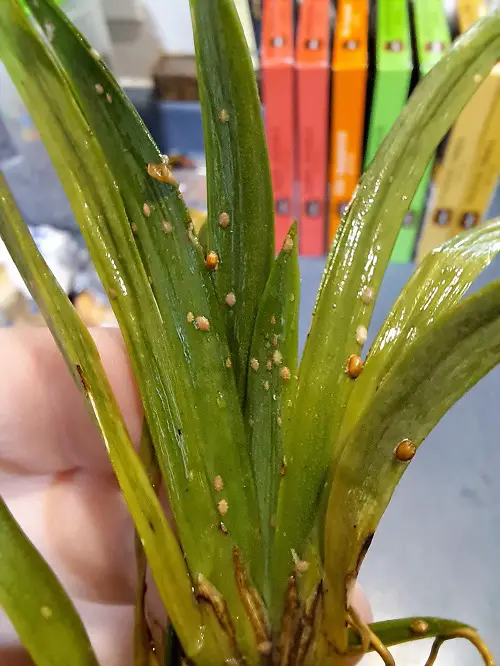
Last on the list is the orchid’s arch nemesis—scale insects! These tiny, flat, oval-shaped bugs often appear as small bumps on orchid stems and leaves. Like many other common orchid pests, they suck the sap from the plant, causing wilting, yellowing, and overall weakness.
To prevent scale insects from occupying your orchid, regularly clean it and provide good airflow. And if they have already taken over, use horticultural oil or alcohol to remove them.
Follow these steps to prevent or treat the most common pests that threaten the health of your beautiful orchid. And once you have these out of the way, here’s what you do with orchids after they bloom!


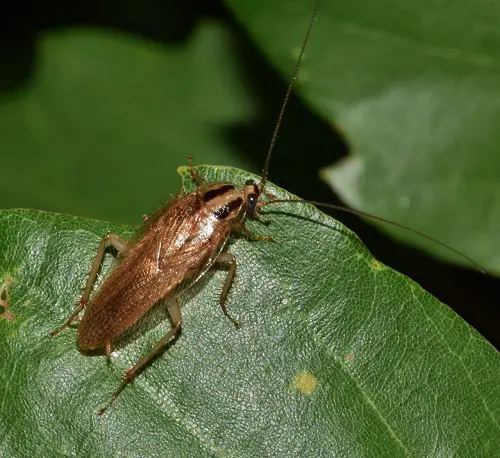
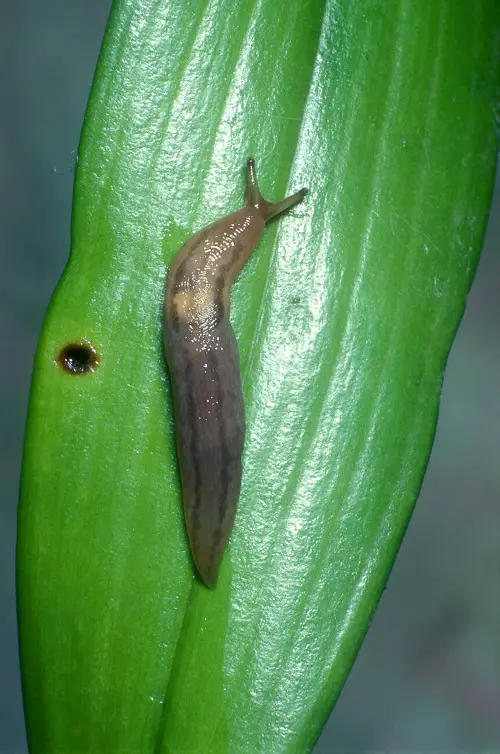

How can you effectively identify and eliminate common pests that threaten the health of your orchids, ensuring they stay vibrant and pest-free?